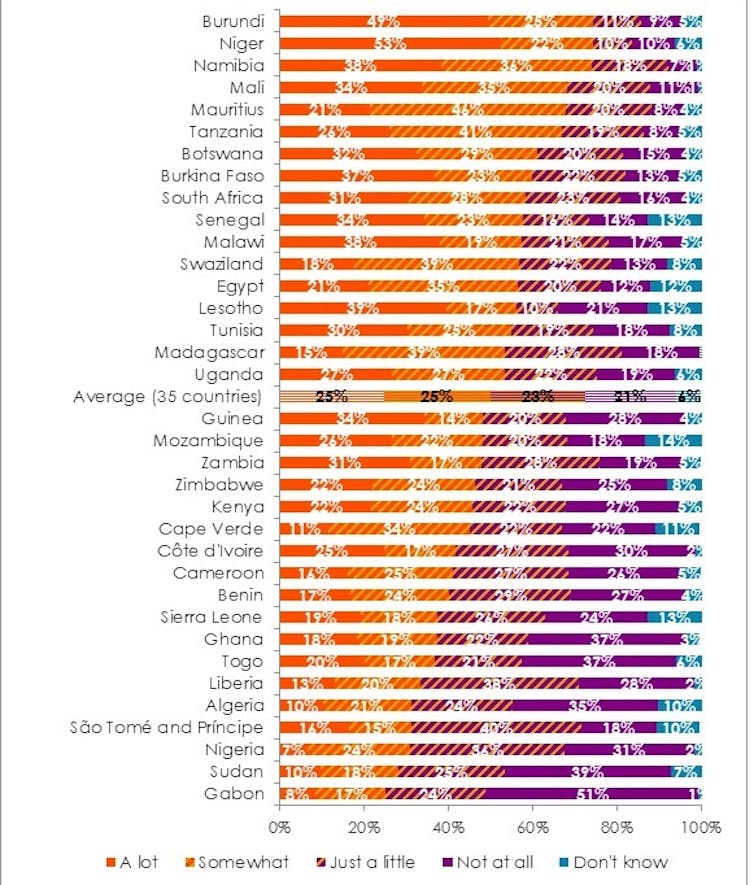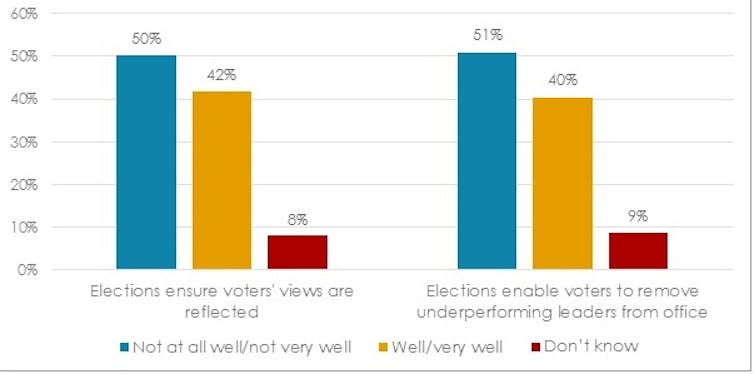Originally published on The Conversation-Africa‘s site.
Only one-third of Africans think that votes in elections are always counted fairly. That’s a problem, as a disputed poll can be a flash point for protests. It also diminishes the public’s faith in democratic processes.
But in citizens’ eyes, problems start long before the polls close. Concerns go back to who gets a fair shot at competing for office, who feels safe in expressing their preferences, and how trustworthy the whole process is.
With at least 25 African countries conducting national elections in 2016-2017, great attention is being focused on election management bodies. These are typically national electoral commissions which are crucial players in electoral processes.
They are also vitally important in shaping public perceptions of how well democracy is working. Poor electoral management can enable election fraud. And, even if it doesn’t swing an election, it can produce political alienation, public mistrust, protest and violence.
The most recent example is Gabon, where bloody clashes erupted after President Ali Bongo claimed a disputed re-election victory. Earlier, in Kenya, opposition calls for electoral commission reforms sparked demonstrations and a violent reaction from security forces. In the Republic of the Congo, election malpractices led to violent protests. In Ghana pre-election anxieties are high amid questions about the electoral commission’s revision of the voter roll for the general election in December.
On average across 36 African countries surveyed by Afrobarometer, a pan-African, non-partisan research network, in 2014/2015, citizens had a generally positive view of the quality of their elections, with 65% assessing their most recent national elections as “completely free and fair” or “free and fair, but with minor problems.”
Despite these generally positive evaluations, many of those surveyed found components of the election process wanting. Just half of respondents said they trusted their electoral commission “somewhat” (25%) or “a lot” (25%) (see Figure 1 below).
Figure 1: Trust in national electoral commissions

In a number countries perceptions were far less positive. These included Sudan (29%), Morocco (34%), Gabon (37%) and Algeria (43%).
Our results mirror the assessments of election quality by experts from Freedom House and the Perceptions of Electoral Integrity Index.
Violence as a factor
Some of the lowest levels of trust were expressed in countries that had experienced closely contested elections in 2016. They included Gabon (25%), São Tomé and Príncipe (31%), and Ghana (37%). Four in 10 citizens (43%) believed the opposition was “sometimes,” “often,” or “always” prevented from running for office, and an alarmingly high 44% said that voters were “sometimes,” “often,” or “always” threatened with violence (Figure 2 below).
Figure 2|Threats of violence at the polls

If voters consider violence part of the election process – as they did at high rates in Nigeria, Egypt, Côte d’Ivoire, Zimbabwe, and Kenya – this may limit citizens’ desire to express their own views. Suppression of the opposition and fear of violence at the polls have effects that are not visible, even in a fair vote count.
Consider those who stay home because the party they support is being harassed or they fear being attacked. These are silent voices that could tip the balance in a close election. Other substantial concerns included the bribery of voters and biased media coverage.
More fundamentally, such barriers to competition and participation may weaken public perceptions that elections serve their intended purposes. Half of those surveyed said that elections do not work well as mechanisms to ensure that people’s views were represented (50%) and that voters were able to remove nonperforming leaders from office (51%) (Figure 3).
Figure 3: Performance of elections in Africa

Countries with the highest levels of dissatisfaction with the representation and accountability performance of elections included Gabon, Morocco, Sudan, Nigeria, Swaziland, and Madagascar.
Election flaws are rarely fixed
Good election management is about ensuring honest and fair political competition. Anything short of that threatens to negate the purpose of holding elections in the first place. Without reliable, scientific survey data to challenge partisan claims, it has been too easy for incumbents to label opposition parties and civil society organisations as “spoilsports”, “troublemakers”, and in extreme cases “traitors” when they raise election quality concerns.
The Afrobarometer survey revealed that ordinary citizens have many concerns about election processes. These were often the same concerns voiced by opposition parties and civil society in protests and post-election petitions.
Despite significant public discontent, shortcomings in the quality of elections are rarely addressed after elections. Post-election protests may be met with government-sponsored repression, and courts often throw petitions out as unsubstantiated or find no way to mitigate the election flaws.
In addition, international observers often pass the buck by saying that although there were flaws in the process these did not determine the outcome of the election. The net effect is that election flaws are rarely fixed. In the worst cases ruling parties exploit them in subsequent elections.
For election authorities honestly promoting better elections, it is necessary to demonstrate high levels of transparency throughout the process and to engage stakeholders directly. Citizens are clearly the key stakeholders in elections.
Related content


